SLC21/WK6: Understanding Burns: Types, Causes, and First Aid Responses
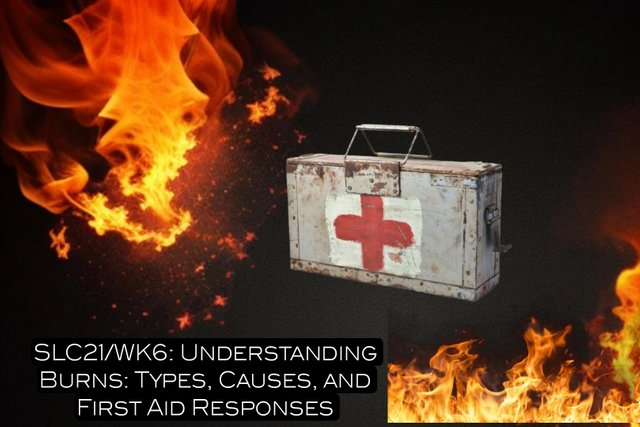 |
|---|
Assalamualaikum everyone.. How are you?
Today I am present in this class to learn and join you. After I have studied some of the materials taught in this class I will answer some questions asked. Happy reading,,
| Write a detailed first aid response for the following scenario: |
|---|
Question 1:
"You witness a child accidentally spilling hot tea on his arm. What immediate steps would you take? What actions would you avoid? Include considerations about the severity of the burn and explain your reasons."
If I were faced with this situation, the first step I would take is to ensure my own safety so as not to be exposed to the hot tea spill. After that I would take a rag or gloves and then help the child as soon as possible and move him to a safe and sterile place.
After making sure the child is in a safe place, then I would try to check the child's arm. Then I would cool the child's arm with running water and have a cold temperature (not ice water) for approximately 15-20 minutes. And after that I will do a compress for the cooling stage.
Approximately 20 minutes later I will clean the area affected by the hot tea using soap if available. If not, I will clean it with clean water. And if it turns out that the child has a wound or blisters, I will bandage the wound with non-stick and sterile gauze. Then I will help him to drink water and try to give him painkillers. And if the child has severe burns, I will seek medical help or refer him to the nearest health clinic.
Some things I don't need to do or avoid:
I will not apply oily materials to the wound. Such as butter, toothpaste and others. In addition, I will also not use cream or lotion on the wound, because it can trap the heat.
I also will not press on the wound area, because it will make the wound worse.
If the wound is blistered, I will not break the blister or the situation will get worse.
Question 2:
"A worker in a warehouse suffered an electrical burn after touching an exposed electrical cable. The location of the burn shows the entry and exit points, with damage to the skin and underlying tissue. What first aid measures should you take, and what important steps should you avoid? How is this different from treating thermal burns?"
To deal with this situation, I will ensure my personal safety, and then I look for the source of the electric current and turn it off quickly. This action is necessary to ensure that I will avoid electric shock.
After the situation is safe, I will then approach the victim carefully and check whether the victim is still conscious or breathing. If the victim is still breathing but unconscious, I will immediately call for medical assistance to help the victim.
I will stay with the victim and make sure the victim is in a safe place until the medical team arrives. And if the victim has an open burn, I will cover it with a clean and sterile cloth, and if necessary I will use non-conductive materials and remove the source of the electric shock from the victim.
Some things I should avoid include, I will not touch the victim before I make sure I have turned off the source of the electric current properly. I also will not move the victim before the medical team arrives. Then I also will not remove the clothes on the victim's body.
The difference between this burn and thermal burns is that burns from electric shock occur on the inside of the body such as the heart and can damage nerves. Help is needed as soon as possible to ensure the safety of the victim. Often burns from electric shock are not visible from the outside, but have a higher level of severity than thermal burns. And this cannot be predicted accurately, so medical treatment is needed as soon as possible.
Question 3:
"A worker in a factory accidentally spilled a strong acid on his arm, causing pain, redness, and blisters. A coworker tried to clean it with water but realized the burn was spreading."
✅a. Identify the type of burn.
Studying this incident, I identified this burn as a chemical burn. This is caused by a strong acid that can damage skin tissue quickly. And it requires immediate medical attention.
✅b. What went wrong with the initial first aid?
This burn should have been treated by pouring running water over the area for at least 20 minutes. to ensure the chemical was completely removed from the contaminated skin area. This is a chemical burn, so it needs immediate treatment, or the burn will spread to other areas.
✅c. Propose the correct first aid steps and explain why each step is important.
The first step I would take is to contact the medical team because the victim needs immediate treatment. While waiting for the medical team to arrive, I will move the victim to a safe place and help the victim to remove accessories in the wound area and cut his clothes carefully to prevent the spread of burns, then I will continuously pour water on the wound for a long time or at least 20 minutes.
If possible, I will bandage the wound with sterile, non-sticky gauze. And finally I will accompany the victim until the medical team arrives to treat it.
Question 4:
You are a first responder in a rural area. Two people were injured in a house fire:
Person A has extensive third-degree burns but is still conscious and calm. Person B has second-degree burns on both legs and is in severe pain.
You can only help one person immediately due to limited resources.
Who is your priority, and why? Support your decision with medical and ethical considerations.
In theory, third-degree burns are more severe than second-degree burns. However, in this case, I will prioritize helping victim B or the one with second-degree burns. I have a strong reason to help victim B Because the burns on his legs can cause great pain and pain, and if not treated quickly it can be life-threatening.
First aid for victims of second-degree burns may be done as quickly as possible, especially to make the victim calmer and give him fluids so that he does not become dehydrated due to lack of fluids.
While for victims of third-degree burns, although the case is more severe, the victim usually will not experience pain because of damage to the nerve endings due to burning. So the victim will look calmer compared to victims of second-degree burns. In addition, it is difficult to provide first aid to victims with third-degree burns because there are no adequate resources at the time and place of the incident, and only the medical team can do it. So the only way to deal with this situation is to contact the medical team as soon as possible and help the victim to remain calm and patient until medical help arrives.
Question 5:
Create an infographic about burn management. Include the following:
a. Types of burns and their causes (electrical, thermal, etc.)
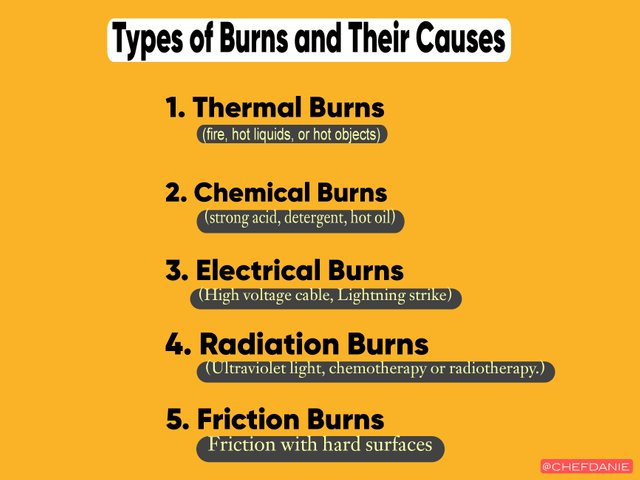
edit by picarts
b. Types of burns (1st, 2nd, and 3rd degree)
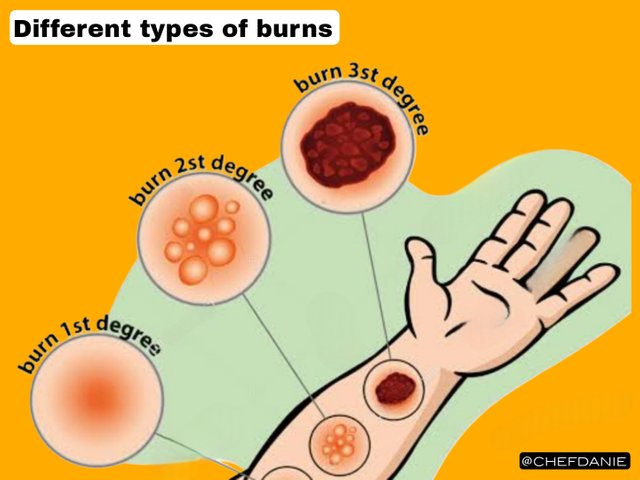
edit by picarts
c. First aid steps for minor and major burns
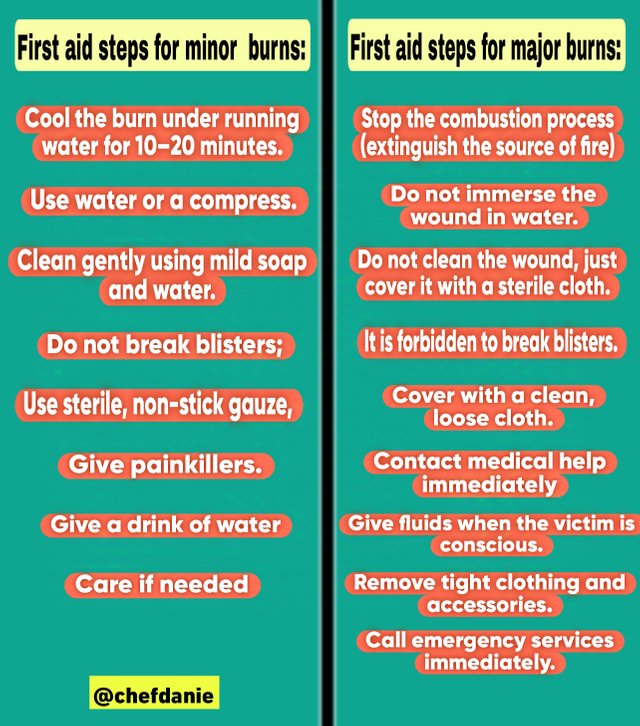
edit by picarts
d. What NOT to Do During First Aid for Burns."
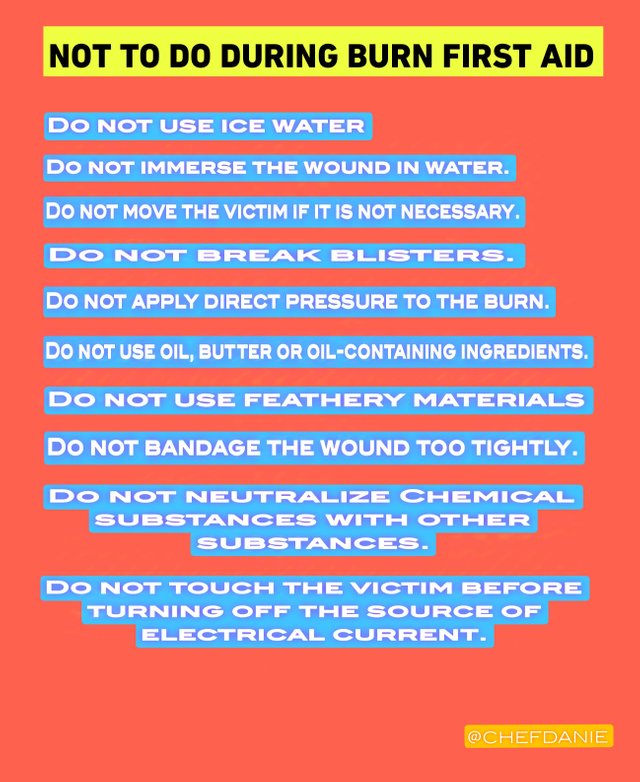
edit by picarts
That's all I have to do, and thank you very much for your attention 🙏
| Invitation : @chant , @itikna09 and @rumaisha |
|---|

Cc:
@abdu.navi03
@huzaifanaveed1
Student Name: @chefdanie
Overall grade: 9.2
Plagiarism Check: Pass
AI Use: no
General Feedback: The student has shown an excellent understanding of this week's course. There were a few shortcomings which I'm sure will be avoided in the upcoming posts.
Thank you.
Regards,
@huzaifanaveed1
Thank you very much for your verification.
Yes, of course I realize that there are still some shortcomings in this post and I will learn more in the future.
I would like to thank you because the lessons in this course are very useful for us to apply in our daily lives
Greetings to you and good luck. 🤗
Hi! You have learned a lot in the lesson, your answers are great and educational for any curious steemian who wants to learn something new.
Have a nice day!
There are many lessons that we can get in this class,, I hope everyone will learn and can understand especially about how to deal with the problem of burn victims.
Thank you very much for your visit and comments.
Ini benar-benar sangat jelas dan rinci semoga sukses sangat bermanfaat
Terima kasih banyak atas tanggapan baik dari anda,,
Saya berharap anda akan berpartisipasi dalam kelas ini..